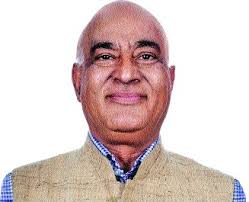Synchronised elections, voter behaviour, and governance outcomes
An active policy proposal of the Government of India is to hold national elections at the same time as the assembly elections of all the states. This article examines whether holding national and stat...
-
 Vimal Balasubramaniam
Vimal Balasubramaniam  Sabyasachi Das
Sabyasachi Das  Apurav Yash Bhatiya
Apurav Yash Bhatiya  28 August, 2020
28 August, 2020
- Articles
Political determinants of newspaper markets in India
Newspapers are an important source of political information for Indian voters. This article looks at how political factors influence the newspaper market. Using the announcement of delimitation in the...
-
 Julia Cagé
Julia Cagé  Guilhem Cassan
Guilhem Cassan  Francesca R. Jensenius
Francesca R. Jensenius  23 November, 2023
23 November, 2023
- Articles
A proposal for public funding of elections and political parties in India
The Finance Minister of India recently introduced measures aimed at cleaning up political party funding in the country. In this article, Gowda and Santhosh highlight the limitations of these measures,...
-
 M.V. Rajeev Gowda
M.V. Rajeev Gowda  Varun Santhosh
Varun Santhosh  21 April, 2017
21 April, 2017
- Perspectives
Facilitating risk-sharing through self-help groups in Bihar
While the self-help group (SHG) programme in Bihar has improved access to low-cost credit for women, this article evaluates whether it improves risk-sharing by examining differences in village-level v...
-
 Orazio Attanasio
Orazio Attanasio  Anjini Kochar
Anjini Kochar  Aprajit Mahajan
Aprajit Mahajan  Vaishnavi Surendra
Vaishnavi Surendra  16 August, 2023
16 August, 2023
- Articles
Impact of Bihar’s alcohol ban on intimate partner violence
This article examines the impact of a complete ban on the sale and consumption of alcohol in Bihar in 2016 on the incidence of intimate partner violence against women. Using NFHS data, it finds that a...
-
 Sisir Debnath
Sisir Debnath  Sourabh Paul
Sourabh Paul  Komal Sareen
Komal Sareen  27 July, 2023
27 July, 2023
- Articles
Is electrification in India fiscally sustainable?
In the first article in the Ideas@IPF2023 series, Barnwal and Ryan describe the completion of household electrification in India as a fiscal feat, notwithstanding the persistent losses recorded by ele...
-
 Prabhat Barnwal
Prabhat Barnwal  Nicholas Ryan
Nicholas Ryan  11 July, 2023
11 July, 2023
- Perspectives
Institutionalising social audits: Lessons from Meghalaya
Sidharth Santhosh summarises key findings from Meghalaya's experience of mandating social auditing for welfare schemes, including the need for stronger coalitions between citizens and the state, and g...
-
 Sidharth Santhosh
Sidharth Santhosh  01 June, 2023
01 June, 2023
- Notes from the Field
Unpacking how MSMEs are defined in India’s manufacturing and services sector
The Indian government announced a number of reforms to help micro, small and medium enterprises that had been affected by the Covid-19 pandemic – including changes in how an MSMEs are classified. Ra...
-
 Rahul Ranjan
Rahul Ranjan  30 May, 2023
30 May, 2023
- Perspectives
The costs of extreme competition for government jobs
Indian states have highly competitive examinations for public service recruitment, with many youth remaining unemployed for long periods to compete for these government vacancies. Kunal Mangal looks a...
-
 Kunal Mangal
Kunal Mangal  21 April, 2023
21 April, 2023
- Articles
How women in politics impact maternal mortality
In the twelfth post of I4I’s month-long campaign to mark International Women’s Day 2023, Bhalotra et al. show that mortality during and after childbirth remains high, even where the knowledge and ...
- Articles
Has Budget 2023-24 been successful in balancing gender priorities?
Ahead of International Women’s Day, Tanya Rana and Neeha Susan Jacob categorise and analyse scheme allocations through the Union Budget’s Gender Budget Statement (GBS), by looking at what schemes ...
-
 Tanya Rana
Tanya Rana  Neeha Susan Jacob
Neeha Susan Jacob  06 March, 2023
06 March, 2023
- Perspectives
Does being local matter? Administrative decentralisation and human development
In this post, Chaudhary and Iyer discuss the administrative decentralisation reforms brought about by the Panchayati Raj Act, and measure the effect of decentralisation on the provision of public serv...
-
 Latika Chaudhary
Latika Chaudhary  Lakshmi Iyer
Lakshmi Iyer  13 January, 2023
13 January, 2023
- Articles
Analysing e-governance service delivery outcomes: Insights from eTaal
In this piece, Trivedi and Mumtaz attempt to analyse the performance of e-governance service delivery across different tiers of government and service categories, through the volume of end-to-end elec...
-
 Fatima Mumtaz
Fatima Mumtaz  Anand Trivedi
Anand Trivedi  04 January, 2023
04 January, 2023
- Perspectives
Improving admissions to technical colleges in India
Following their note on the issues that may arise from the ambiguity of EWS reservation policies, Aygün, Turhan, and Yenmez provide a critique of the multi-run deferred-acceptance algorithm currently...
-
 Orhan Aygün
Orhan Aygün  Bertan Turhan
Bertan Turhan  M. Bumin Yenmez
M. Bumin Yenmez  16 December, 2022
16 December, 2022
- Perspectives
Challenges of executing EWS reservation efficiently
A recent Supreme Court judgement excluded members of reserved categories from the scope of EWS. Aygün, Turhan, and Yenmez look at the implications of this decision, including reserved category member...
-
 Orhan Aygün
Orhan Aygün  Bertan Turhan
Bertan Turhan  M. Bumin Yenmez
M. Bumin Yenmez  14 December, 2022
14 December, 2022
- Perspectives
Twitter feed
Tweets by Ideas4IndiaMost Popular Governance Posts
Unique Health Identification and Aadhaar: A case for mandatory linkage
As part of the Digital India initiative, All India Institute of Medical Sciences (AIIMS) issues a Unique Health Identification (UHID) number to each patient, which documents their entire journey in th...
 Mudit Kapoor
Mudit Kapoor  23 December, 2016
23 December, 2016
- Perspectives
Caste dominance in rural India: Cause and effect
Rural India remains a caste-based society. This column explores why caste continues to play such an important role and what the effects are. It argues that trade and agricultural productivity suffer, ...
 Siwan Anderson
Siwan Anderson  16 August, 2012
16 August, 2012
- Articles
Why did the Indian economy stagnate under the colonial rule?
How did the Indian economy fare under the colonial rule? Is the average Indian significantly better off after Independence? This column examines trends in GDP per capita in order to determine the stan...
 Aniruddha Bagchi
Aniruddha Bagchi  16 September, 2013
16 September, 2013
- Articles





 16 November, 2023
16 November, 2023






